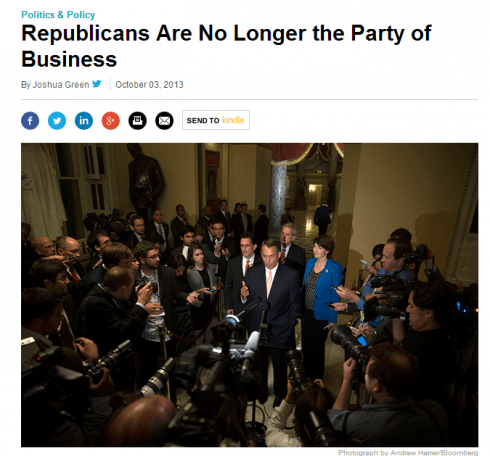That is the remarkable title from an article in BloomburgBusinessweek:

Larger businesses, which often tilt more heavily toward the GOP, are no less frustrated. It’s hard to find any organization more closely affiliated with the Republican Party than the U.S. Chamber of Commerce. In 2012 the business trade group spent $35,657,029 on federal elections, according to the Center for Responsive Politics. Of that, $305,044 was spent on behalf of Democratic candidates. Last year the Chamber went further to help Republicans than it ever had by running ads directly against candidates: It spent $27,912,717 against Democrats and only $346,298 against Republicans.
All that money ensures a careful hearing when the Chamber wants something from Republicans—but it doesn’t guarantee they’ll listen. On Oct. 1, House Republicans ignored the Chamber’s pleas to keep the government running. The shutdown is costing the U.S. economy $300 million a day, according to IHS (IHS), a global market-research firm, and it’s only the latest sign suggesting that the old adage, “Republicans are the party of business,” no longer holds true. From the austerity imposed by sequestration to the refusal to reform immigration laws to the shutdown and now, as appears likely, another debt-ceiling showdown when U.S. borrowing authority expires on Oct. 17, the GOP’s actions have put a strain on one of its most valuable partners: the business community.
Probably the biggest thing that got missed in the Fed’s decision to not cut back on it’s QE activities is their determination that the biggest risk left to this economy was the dysfunction in Washington. This dysfunction doesn’t seem to stop the Chamber and business groups from buying up all of the politicians (both sides do it for real this time!) they can get. I really thought that in the last Debt Ceiling fight that the business community would be an influential voice in getting the GOP to do the right thing. And I was wrong.
The rising antigovernment sentiment within the GOP does not always conflict with the desires of the business community, especially on issues such as regulation. But the shutdown and debt ceiling are both matters where they do—and the unwillingness of Republican lawmakers to shift course underscores the diminished clout of their traditional business allies, despite the financial largesse. Asked by the Associated Press if he had heard business groups express alarm about the economic impact of a shutdown, Republican Representative Dana Rohrabacher of California replied, “No. And it wouldn’t make any difference if I did.”
There you go. A party hell-bent on damaging all of us — even the people who are their best allies. So what happens next? Is there some line — which crossed — will get the business community to push back on these teajhadis in some serious way?